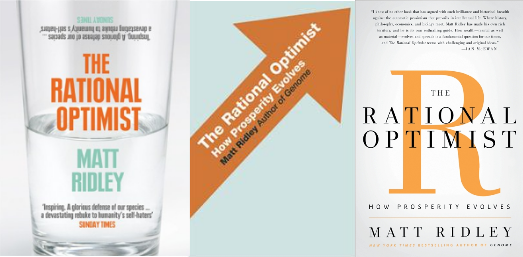
“An elegant and devastating rejoinder to all the gloom-merchants everywhere.” – Boris Johnson
Join renowned science author Matt Ridley as he leads the reader gently away from the cloudy, gloomy bogs of pessimism and firmly towards the sunny cheerful uplands of optimism. Along the journey, Ridley not only describes how things are getting better, but he also describes why.
The central case Ridley makes is that life is getting better almost everywhere you look at it. In an almost companion piece to Peter Diamandis’ Abundance and Steven Pinker’s The Better Angels of our Nature, Ridley shows how food availability, income, and lifespan are up; while disease, child mortality, and violence are down. We are living longer, healthier, wealthier, safer lives than at any time in the past. Access to food, clothing, fuel, and shelter has been getting cheaper with each passing decade. At no point, however, does Ridley deny the obvious poverty, misery, and violence we also see in the world. He just puts it in the right context.
Packed with information, backed up by meticulous research, and bolstered with solid data, Ridley covers the breadth of human history from the Neolithic era to the current 21st century. Along the way he regales the reader with tales of the stagnation of the Ming dynasty, spins a few yarns about the invention of the steam engine, and recounts possible consequences of climate change.
Ridley makes an interesting point in the book. Time, he says, is the key. “Forget dollars, cowrie shells or gold. The true measure of something’s worth is the hours it takes to acquire it.” He thus redefines poverty and prosperity. Prosperity, he avers, is the increase in the amount of goods or services one can earn for the same amount of work. By this measure, mankind has been getting more and more prosperous almost anyway way you look at it: from access to electricity, technology, transport, calories, and shelter. On the other hand, a person is poor to the extent that they cannot afford to sell their time to buy the services they need.
To those who pine for the glory days of our past, naively believing in Rousseau’s vision of the noble savage, Ridley has this repost: “Two-thirds of modern hunter-gatherers are in a state of constant tribal warfare […] 30% of their adult males die from homicide.” 100 million people died in modern state warfare in the 20th century. If we used the statistics that was typical of hunter-gatherer societies that number would translate to 2 billion. In other words, yes, war has caused death, but nowhere even close to the extremely high rate at which people died of war in the past.
Another crucial point Ridley draws our attention to is the notion that human success is due to the exchange of ideas. Ideas have sex (metaphorically). They meet, mate, and mutate. And it is this, combined with an economic setting of trade and barter that drives forward invention, technology, and progress.
Technological progress is not guaranteed simply because we are human. We also need that critical mass of people to ensure individuals in a society have enough time to create and to exchange their creations. Ridley reminds us that sparsely populated places like Tasmania and the Andaman islands were little more advanced than Neanderthals: they had no bone tools, no fish hooks, no barbed spears, and no fish traps. It was not that they were primitive intellectually; it’s just that they didn’t have a dense enough population and access to ideas from other humans. “It is the ever-increasing exchange of ideas that causes the ever-increasing rate of innovation in the modern world.” Stagnation is impossible in a free-exchanging world.
In the chapter, ‘Escaping Malthus’s trap,’ he reaches the conclusion that our species will stop its population expansion when individuals are all trading goods and services with each other rather than trying to be self-sufficient. He quotes, Ron Bailey, “There is no need to impose coercive population control measures; economic freedom actually generates a benign individual hand of population control.”
Towards the end of the book, he addresses the common reasons people have for being pessimistic about the current state of affairs we humans find ourselves in. It is anti-historical, he avers, to be pessimistic. The world has constantly been getting better and will continue to do so, he opines, even as he backs up his statements with solid evidence and historical facts.
He concludes the book with a clarion cry in favour of optimism. Innovation and economic evolution will raise the standards of the 21st century to unimagined heights. He makes a final stand for the sharing of knowledge. We are sharing like never before: “People are willing to share their photographs on Flickr, their thoughts on Twitter, their friends on Facebook, their knowledge on Wikipedia, their software patches on Linux, their donations on GlobalGiving, their community news on Craigslist, their pedigree on Ancestry.com, their genomes on 23andMe, even their medical records on PatientsLikeMe. This catallaxy will result in intelligence becoming more collective, work becoming more specialised, leisure more diversified, and innovation more bottom up.
At the end of the day, this is a book breath-taking in its scope, refreshing in its message, and revelatory in every way. – A must-read for everyone who dares to be an optimist.